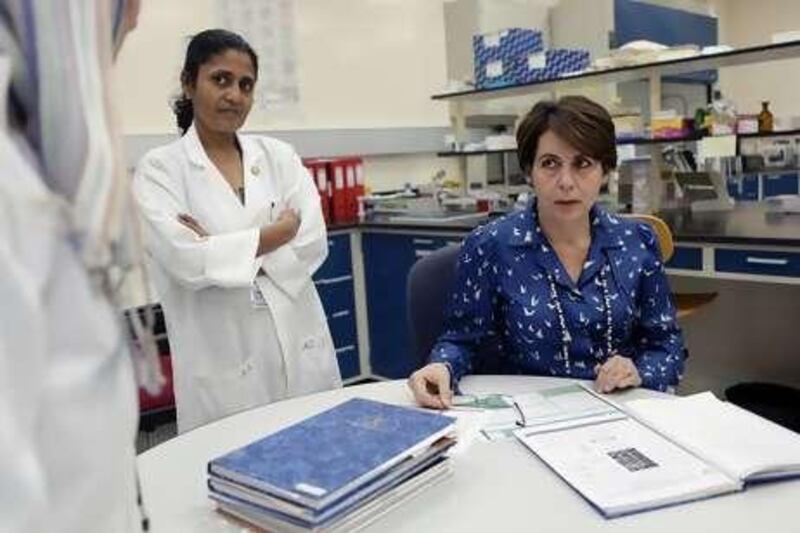AL AIN // Recent talk about the regulation of Emirati marriages could have positive health implications for future generations. At a majlis on Sunday evening, religious and community leaders discussed the idea of regulating marriages. Among the proposed regulations was the idea of screening couples for hereditary diseases. However, proposed restrictions for Emiratis marrying foreigners could also limit the gene pool.
Since arriving in the country 20 years ago, Dr Lihadh al Gazali has made genetic diseases her life's work, conducting research out of UAE University and offering counselling and support for families with children who have genetic disorders from her clinic at Tawam Hospital. She has seen her caseload triple in the last decade. Even her premarital screening for couples with a family history of genetic disease - made compulsory last year in cases of the blood disorders thalassaemia and sickle cell disease - is not always effective.
"If alternatives are not available, they will simply ignore your advice," Dr al Gazali said of such couples. "For prevention to work, there must be options." The Ministry of Health rates genetic diseases as the fourth-highest cause of death in the country. There are 270 kinds in the UAE alone. About 60 per cent of those, including sickle cell anaemia and thalassaemia, are recessive disorders that can be caused by consanguinity.
Sudan is the worst country for birth defects, with 82 per thousand live births. The UAE has 75.9 per thousand, the US 47.8 and the UK 43.8. France has the lowest rate, at 39.7 per thousand. Consanguinity is more common in traditional, less urban parts of the UAE, such as Al Ain. But overall more than 50 per cent of the population is believed to marry their first cousins, which, said Dr al Gazali, doubles the chance of birth defects.
In 2001 Iran took the dramatic step of amending the law to allow selective pregnancy termination, up to 15 weeks, for thalassaemia. The move resulted in a 70 per cent decline in incidence of the condition. Dr al Gazali would like to see the Government here take less drastic action, introducing pre-implantation diagnosis, an approach that has proved popular in Saudi Arabia. At a cost of about Dh15,000 per patient, the procedure allows couples who are deemed at high risk for certain genetic diseases to proceed with in-vitro fertilisation. The foetus can then be tested for abnormalities at one of the earliest stages, when it is between four and eight cells.
That satisfies Islamic law, under which abortion is illegal but cells can be discarded at such an early stage so couples can try again for a healthy child. If the foetus is found to be healthy, the cells are then implanted into the female's womb for a regular pregnancy. Pre-implantation diagnosis is an option 90 per cent of her patients want, said Dr al Gazali, even though the success rate for disease detection is low.
Some private clinics in Dubai offer the service but she says that as they are not regulated, it is not advisable. Some may argue that the key to prevention of many genetic diseases is to stop intermarriage, but that is "simplistic", argues Prof Alan Bittles, a professor based at the centre for human genetics at Edith Cowan University in Perth, Australia. People from the same tribe can also be highly genetically similar, he said.
"You can't just compare the health of those children born of cousins but the comparison must be made within the tribes as well as between them, as some disorders are unique to particular tribes," he said. "To stop consanguinity affecting health, you'd not only need to stop first cousin marriage but people in the same clan too, which is highly improbable and going against centuries of tradition." Dr Anand Saggar, a clinical geneticist based in London, sees patients from the Gulf ? who have been sponsored by their governments ? at his clinic in Harley Street.
Western prejudice and health economics have led to the negative attitude towards cousin marriages, which are legal and accepted in many parts of the world, he said, pointing to Amish communities in the US. "We'll never get rid of any old genetic diseases because our genetic code keeps on mutating. You just have to accept that genetic disease is part of our evolution. It is a foolish and erroneous assumption that to stop marrying cousins would eradicate genetic disease."
Dr al Ghazali's team has already, in conjunction with researchers at the University of California, discovered a genetic disorder, which has not been named, that causes disabilities, sight and skin problems. Last year, the National Research Foundation awarded her team a Dh37 million grant over five years to establish a dedicated centre for genetic research. The centre is vital to developing homegrown expertise, she said.
In the meantime, she sees prevention as key. Part of her campaign is to have the issue included in secondary school curriculums. "If children are taught about genetics and consanguinity and the disorders here from an early age they can make more informed decisions when they grow up," she said. @Email:mswan@thenational.ae





